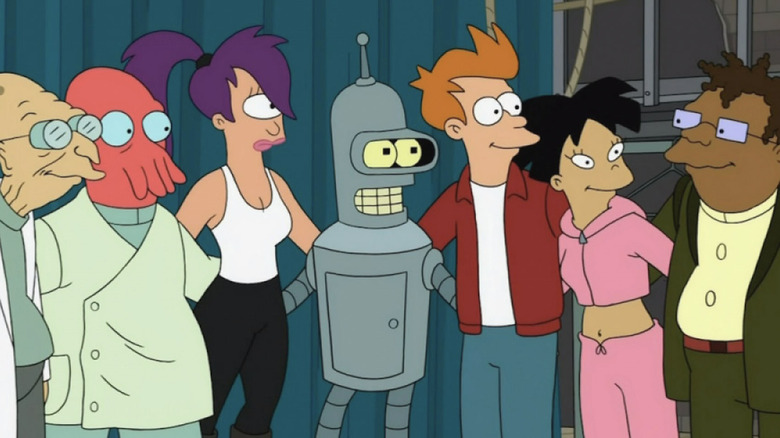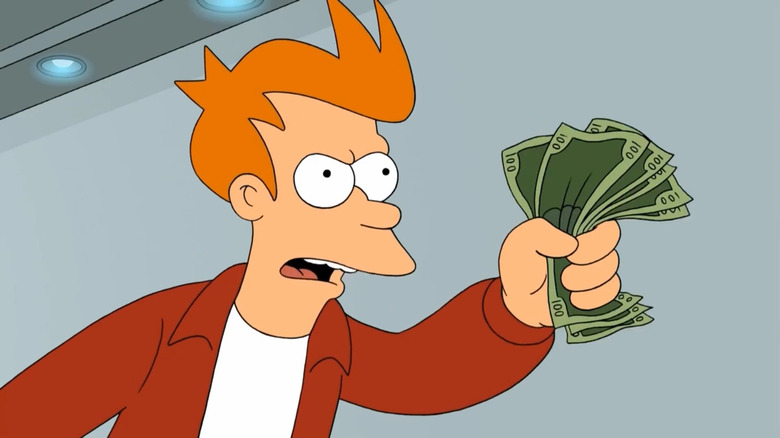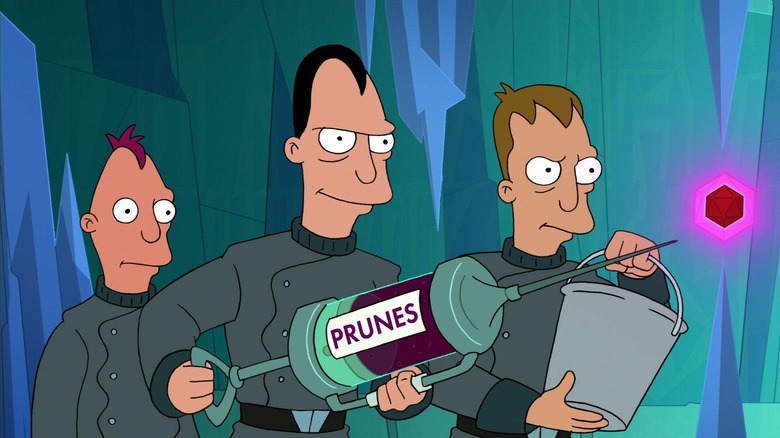There's A Simple Secret To Keeping Futurama's Humor Fresh
Matt Groening's and David X. Cohen's animated sci-fi comedy series debuted just in time for the end of the millennium — on March 28, 1999. It ran for four seasons before its cancelation by Fox in 2003. That was meant to be the last word on "Futurama." Farewell, friend.
After five years of wound-licking and brainstorming, "Futurama" returned in 2008 with four feature length, straight-to-video movies ("Bender's Big Score," "The Beast with a Billion Backs," "Bender's Game," and "Into the Wild Green Yonder"), each one constructed like a four-part mega-episode. Those movies were meant to be the final hurrah for "Futurama." It was a good run, compadre. Vaya con Dios.
But, wouldn't you know it, Comedy Central saw some potential in resurrecting a recognizable cult property and began airing new seasons of "Futurama" in 2011. The show was granted three additional full seasons on Comedy Central before being once again canning the show and finally letting it go in 2013. It was a nice 14 years of life. Good night, sweet "Futurama." And flights of angels sing thee to thy rest.
A decade after the show's tertiary cancelation, new episodes of "Futurama" will be arriving on Hulu in 2023. Like Jason Voorhees, the undying "Futurama" staggers relentlessly forward.
After so many years and so many lives, how do the writers on "Futurama" keep coming up with fresh jokes? During a 2018 interview with Comics Online, conducted at that year's San Diego Comic Con, Groening, actor John DiMaggio (Bender, and many others), and writer Josh Weinstein revealed there was always only ever one rule: Can the writers make each other laugh?
Shut up and make it funny
Groening doesn't seem concerned with a target audience or a demographic. That sort of thinking can drive a writer insane, as it's going to be just as impossible to please a niche audience as it is to appeal to a universal one. As such, "Futurama" seems to have long ago adopted the practice of aiming to please the "Futurama" writers. If a room of kooky math nerds and sci-fi weirdos can laugh, it gets in the show. Oh, and if DiMaggio thinks it's funny. That, too, appears to be an important bellwether. As Groening said:
"The secret is, honestly, we try to make each other laugh. And the fun thing is that the writers are trying to make each other laugh when we're writing the show. We try to do some designs that have some kind of wit and fun to them. And then our favorite thing is when we have our table read when we can bring the script for the first time and sit down with the actors and they perform it. And when you can make John DiMaggio laugh, at somebody else's joke, it's like it's heaven."
Those who are familiar with DiMaggio's voice knows what Groening is talking about. DiMaggio has a wonderful catalogue of big, booming, hearty voices that has served him well on shows like "Futurama," "Adventure Time," "Samurai Jack," "Batman: The Brave and the Bold," and "The Animated Tales of GWAR." A genuine DiMaggio laugh sounds amazing, and knowing you were the one to elicit it must be one of the more blissful feelings a writer can experience.
The actors paying it back
DiMaggio, however, also pointed out that the actors on "Futurama" would also feel responsible for honing the already-brilliant writing into something even more perfect. Weinstein, in the interview, briefly admitted that the "Futurama" writers were indeed trying to make DiMaggio laugh, but DiMaggio wanted to stress that he wants the writers to giggle at the actors as well. The interplay allows for an intense devotion to the joke, all but ensuring that at least some audiences members might find it funny as well. DiMaggio explains:
"There's another thing. As the actors, we're just trying to impress the writers. They hand us this gold and we just gotta buff it, we gotta melt it, we gotta make it into statues you know? It's just this beautiful mind meld when you get down to it, when you're doing an animated show. So many parts have to fit together. When they do, it's magic. It's great. 'Futurama' was a well-oiled machine, out of the gate."
DiMaggio also admits that, after so many bloody incarnations, familiarity didn't breed contempt, but an instinct about the way the writers and actors will construct a joke. After a long enough time, it seems that the cast and the creatives are merely on the same wavelength. Eventually, the writers could write to DiMaggio's strength, and DiMaggio just knew how to deliver those oddball sci-fi jokes. He said:
"The familiarity is key and knowing–already having the idea of the jokes that are gonna come out how we all tell those jokes and how we've been telling those jokes in the past and how we keep, you know, it's just sick."
"Futurama" will return in 2023. Probably also 2030, 2041, 2043, and 2077.


